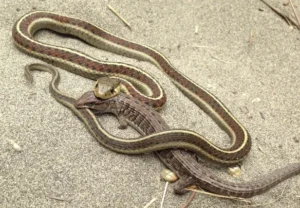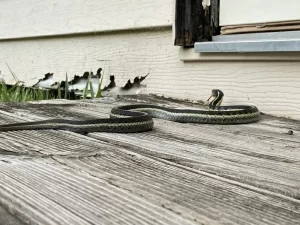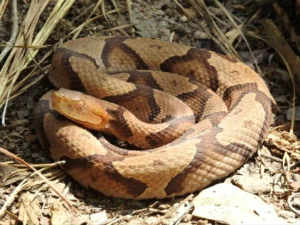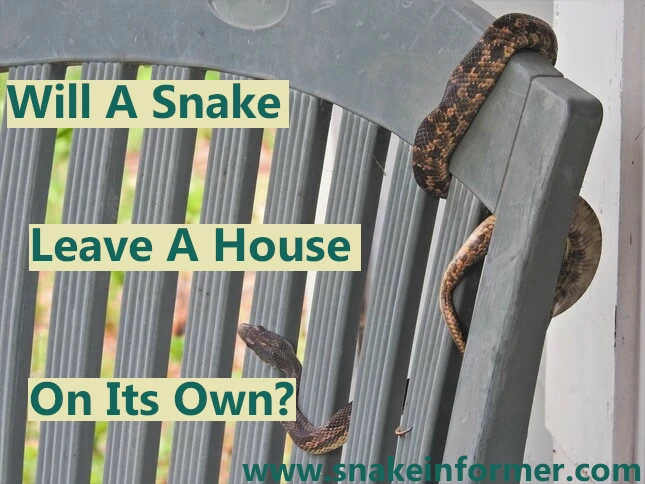Snakes are the second largest group of reptiles after lizards. These animals live in a wide variety of habitats from forests to deserts, and even urban areas. Sometimes, snakes wander into people’s backyards and even enter homes.
Snakes often enter houses in search of food, water, or protection from the elements. If a snake can not find these conditions inside the house, it may leave on its own.
This is especially true for snakes that wander in by mistake.
If a house provides food (for example rodents) and hiding spots, a snake may not leave for quite some time.
Why Do Snakes Enter Houses?
Before knowing whether or not a snake will leave a house on its own, it’s important to know why it ended up inside the house in the first place.
Snakes don’t usually enter houses deliberately. They often wander inside, while searching for resources, or exploring their environment.
1. Search for a Meal
Snakes are carnivorous predators, that hunt insects, and small animals such as rats, mice, frogs, and lizards.
Trash piles, birds seed, or even uneaten pet food left outdoors, can attract mice, insects, and lizards which feed on the insects.

The presence of these creatures can attract snakes searching for a meal – and these snakes may wander into your house.
Even if there are no rodents in your home, snakes may still get in, on their search for food.
2. Search for Water Or Moisture
All animals need water to survive, and snakes are no exception.
Snakes often slither into people’s homes in search of water, or moisture.
They may seek out leaky water pipes, or other damp areas such as sinks, toilets, or bathrooms.
3. Search for Shelter
Like all reptiles, snakes are cold-blooded (ectothermic) animals.
This means they cannot internally regulate their body temperature. Instead, their body temperature changes with the temperature in their surroundings.
In other, their environment is the main influence on their body temperature.
As the temperature changes at different times of day and night, they move around in their environment to regulate their body heat. This is known as “thermoregulation.”
When their body temperature is low, they move into the sun to warm up, when it is high, they move to the shade to cool down.
On hot sunny days, snakes can be attracted to the cool shade of your house, and may seek out damp areas to hide.

In the wild these snakes often hide in spaces under rocks, to escape the heat, and many areas of your home can provide a similar environment.
During cold months, snakes may enter your house in search of a place to overwinter.
4. Habitat Disruption
Sometimes snakes may wander into your home because their habitat has been disrupted.
For example, in areas that experience flooding, snakes often move to higher ground and may be driven into people’s homes, seeking safety.
In addition, human destruction of forest areas may also lead to these snakes ending up inside nearby houses, in their search for new shelter.
5. Safe Breeding Nests
Snakes often enter houses looking for warm, dry locations that are free of predators to nest and reproduce.
Snakes typically nest in dark areas of the house, so a dark basement or crawlspace can be used for nesting.
6. Accidental Entry
Snakes can also get into your house entirely by accident.
If you leave a window or door open even slightly open, a snake can easily slither inside as it moves around its environment.
Snakes Will Sometimes Leave Houses on Their Own
There are situations where a snake may choose to leave your home on its own, especially if the conditions inside are not suitable for its survival.
For example,
- A snake that accidentally entered your house while chasing prey, may choose to leave if it doesn’t find rodents or other small animals to eat.
- A snake that wandered in while seeking shelter or nesting sites, may leave if it doesn’t find secure hiding spots.
As mentioned earlier, snakes do not often enter houses intentionally. They simply wander in, while looking for food, shelter, or other resources necessary for their survival.
If a snake can not what it needs to survive, it will look for a way out, and go to a better environment.
Some Snakes May Stay In a House for a Long Time
While some snakes may leave a home on their own, others might stay inside for a long time.
This usually happens when the conditions indoors provide what they need to survive, or when they can’t find a way out.
Here are a few reasons why a snake may stay inside a house.
- Abundance of prey
If a snake wanders inside a house and discovers lots of rodents or lizards it may decide to stay.
Many smaller snake species, also regularly feed on insects, so insects such as Cockroaches could draw them in.
As long as a snake has enough food to survive inside your home, it has little reason to leave.
- It Can’t Find a Way Out
Sometimes, a snake may stay inside a house because it can not find a way to leave.
This can happen, for example, when a snake enters a house through an open door, and then finds the door closed when it tries to leave.
Snakes need a clear, and visible exit to leave a house.
What to Do if You Find a Snake Inside Your House
If you find a snake inside your house, it’s important to stay calm and keep your distance.
Do not try to interact with the snake in any way, even if it’s not venomous.

The vast majority of venomous snake bites in the US happen when a snake is accidentally stepped on – or when people have already seen a snake, but try to interact with it rather than just moving away.
It’s very important to avoid touching or trying to kill the snake.
To create a way for the snake to leave on its own, open a nearby door or window that leads outside.
Ideally, open the same path the snake may have used to enter. Make sure the area is quiet and free of obstacles so the snake feels safe moving toward the exit.
If the snake seems hesitant to leave, try leaving the area while you wait.
Snakes tend to be shy and are more likely to leave the house when they feel they are not being watched.
Lastly, if the snake still won’t leave, even after being given a clear exit, contact a local wildlife removal expert.
How to Keep Snakes Away From Your Home
If you want to stop snakes from coming into your house, you have to make the area around your house less attractive to them.
Here are several things you can do to keep snakes from entering your house.
1. Keep Mice and Other Small Animals Away From Your House
One of the easiest ways of keeping snakes away is to get rid of the “snake food” (prey animals) you have in or around your house.
You can do this by getting rid of trash piles, or anything that may attract rodents or insects.
Ensure that food scraps are disposed of properly, as rats and mice are attracted to places where they can find food.
Also, avoid leaving uneaten pet food outdoors, and consider storing any bird seed in rodent-proof containers.
In essence, make sure there is nothing in or around your house that can attract mice or other animals that snakes prey on.
2. Seal All Entryways
Block off as many possible entryways to your house as possible, to reduce the chance of a snake slithering inside.
Screen all outside vents, seal cracks and holes around the foundation, and make sure doors and windows fit tightly.
In addition, seal off access to basements and crawlspaces.
Many adult snakes can squeeze through spaces only a few inches wide, so even tiny holes should be blocked off.
3. Keep Your Grass Short
Tall grass provides the perfect cover for snakes to hide in. It also attracts mice and other small animals that snakes prey on.
Keep your grass, and other vegetation around the house short. This will discourage snakes from coming into your yard, and into your home.
It will also make it easy to spot the snakes that do end up in your yard so you can get rid of them.
4. Clear Dead Leaves and Other Dead Vegetation
Snakes love to hide under dead logs and leaf litter on the ground around your house.
Getting rid of these will keep snakes away because they will have fewer places to hide.
5. Keep Firewood, Compost Piles, and Other Types of Debris Away From Your Home
Snakes love to hide in well-covered areas outside. Compost piles or stacks of firewood and lumber are the perfect places for snakes to hide.
If these are kept close to the house, snakes can easily make their way inside.
Store firewood, lumber, and other piles of debris away from your home.
6. Be Vigilant During the Warm Seasons of the Year
Snakes and other reptiles are most active when the temperatures are warm.
Be alert during this time of the year and watch for any snakes that may end up in your yard, so they do not get inside your house.
Conclusion
Snakes will never come into your house to cause harm.
Instead, they often end up inside the house in search of food, shelter, or even by accident.
A snake that enters your house can stay inside for weeks, or even months if it can find adequate food, water, and hiding spots.
Hi, my name is Ezra Mushala, i have been interested animals all my life. I am the main author and editor here at snakeinformer.com.

